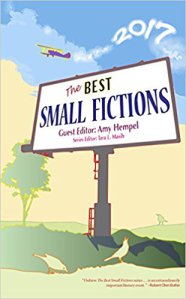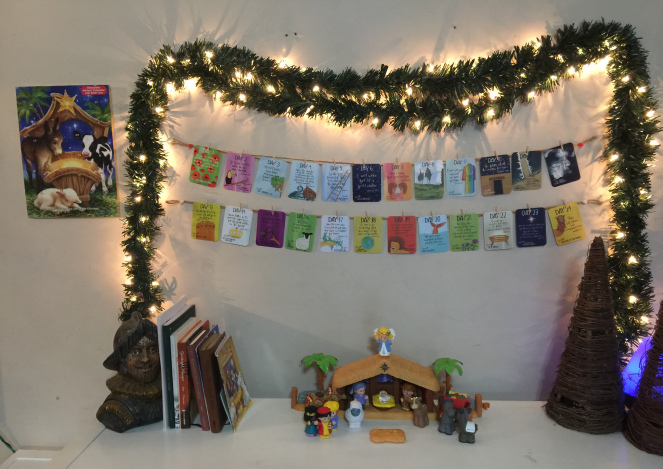 What do you read if you don’t have the time to read a book like War & Peace? Luckily, much like the modern world, where immediacy and quick fixes are all the rage, literary greatness can be found in writings of a much more digestible length. Flash fiction stories still wield a philosophical heft and still leave the reader mulling on greater questions, but are restricted to far more compact length limits. Hard-hitting and captivating, they are usually no longer than a few pages and combine the storytelling of the great works with the ability to be read in the time it takes to drink a cup of coffee (or even just the time to take a sip!). So, if the burden of reading Atlas Shrugged isn’t for you, then The Best Small Fictions 2017 may be the answer.
What do you read if you don’t have the time to read a book like War & Peace? Luckily, much like the modern world, where immediacy and quick fixes are all the rage, literary greatness can be found in writings of a much more digestible length. Flash fiction stories still wield a philosophical heft and still leave the reader mulling on greater questions, but are restricted to far more compact length limits. Hard-hitting and captivating, they are usually no longer than a few pages and combine the storytelling of the great works with the ability to be read in the time it takes to drink a cup of coffee (or even just the time to take a sip!). So, if the burden of reading Atlas Shrugged isn’t for you, then The Best Small Fictions 2017 may be the answer.
Back for its third year, this anthology of the best international flash fiction of 2017 is a heavyweight collection of emotion-laden injections of pure fiction heroin. The wholly volunteer team at TBSF have drawn together some of the most compelling flash fiction, and they have shown once again why this is not a genre to be scoffed at. With fifty-five stories, the volume is enthralling. Even as a lover of long detail-abundant stories, I found myself unable to put the collection down, forcing myself to stop reading only so that I could digest the content and ruminate on what the stories left unsaid, before once again entering the rabbit hole of content squeezed between the covers.
The foreword and the introduction by departing editor Tara L. Masih and guest editor Amy Hempel, respectively, open with the tribulations that the publication has faced and the voracity with which this latest volume has been brought to life. They both lovingly touch on the joys of editing such a varied collection and pass the reigns to new editors in the coming years; their final words impart the values, styles, and themes that have gone into TBSF 2017—interestingly the most important take-away being the inclusion of birds in the imagery and content of the majority of the stories contained therein.
The collection opens with two stories by Joy Williams, and any sense of light-heartedness taken from the editors’ notes or design of the collection is quickly laid to rest with these two relatable tales of modern love. Williams condenses a significant helping of human emotion into the pair of drama-laden narratives, where there is no beginning or end to the story, but rather middle segments that tell us enough to know what is being said, yet not enough to put to bed all that is being said. One story is about a widower attempting to shrug off the weight of a life full of false loves, the other about a woman whose inclination to odd holiday behaviours leads her to discover a macabre and melancholic reminder of American history.
The pace only quickens from here, with story after story flowing from page after page, and though some stories may speak to certain readers more than others, there is always a theme or a writer to suit the tastes of anyone who is reading.
With such tight limitations on length, the book of rules and usual normalities of prose construction are thrown out the proverbial window. The authors find unique and refreshingly exciting ways to convey the tales they wish to tell; the imagery found in each piece of fiction comes at the reader hard and fast, at times blurring into half-castes of poetry and fiction.
In Summer Scalping and Syndication, I was accosted with tales of rural Americana, full of a dread and tension rarely found within entire chapters of works, let alone pages. Works such as Election Cycle discard any semblance of shyness or fear of metaphor, wandering forcefully and joyfully into the chaos of politics and the absurdity of the American election process. And then there are stories such as Bildungsroman, which shed all subtlety and forge headlong into pure skin-tingling horror and abstract terror. The stories are not limited to just American writers (though the majority of stories are from such)—the helpful and extremely well laid out author bios preceding each story demonstrate the multi-cultural nature of the collection and the diverse pool of backgrounds from which the stories arise.
TBSF 2017 is a volume that does not shy away from bold narratives. The stories made me feel a spectrum of emotions not usually felt when reading a singular novel; some works carried an extraordinary eroticism to them, an arousing self-reflection, while others bordered on the morose or crossed thresholds into hallucinatory allegory. As Hempel explores in the introduction, these stories are all in some way – however minute – teachings, parables, philosophies and learnings. The events of each short story linger long after finishing, leaving me to think beyond the glimpses readers are given into their world. When there was warmth to the stories, however, I was made to ponder: Is this temporary, or perhaps a ruse to hide the underlying melancholy of the paragraphs? And this is where the birds come in—TBSF 2017 is not a collection of happy stories. Death, loss, and survival are the underlying themes weaving the narratives into a cohesive thematic whole. Throughout human history, birds have been believed to be associated with all facets of human existence and the otherworldly, from being seen as the messengers of the gods to being manifestations of the soul itself; and here they appear throughout the stories as both symbols and characters, as omens, and as signallers of deeper meanings. The birds tie intimately into the thematic strands knit by the authors and reveal themselves to be far more important than one would believe.
Overall, the The Best Small Fictions 2017 is a fantastic read, full of wonder, excitement, and sadness. Turning the pages, I found myself honestly hoping that there would be one more paragraph, one more sentence, or one more story from many of the authors included — demonstrating the pure talent that has been squeezed into the third collection.
By the end, one assuredly knows exactly how accurate the term “flash” is, with each story being a blinding light, an illumination that reveals a host of literary joy. Each piece offers a glimpse into the heart of its author, which reveals itself more and more on each successive reading. The fact that this is the final selection of stories from the submitted hundreds only makes me hope that in the future there are more than fifty-five selected.
***
 Mars Yuvarajan is a Tamil New Zealand poet. He holds an MFA in Creative Writing and lives in New Hampshire, when not traveling the world. He has published six poetry collections to date: Night Owl and Other Poems, Kintsugi, .M.oments (Volume One), Quiet Songs From Yesterday, We Live With the Departed, and In My Dreams I Walk Through Killing Fields. He owns and runs the independent publishing house Works of Mars Press.
Mars Yuvarajan is a Tamil New Zealand poet. He holds an MFA in Creative Writing and lives in New Hampshire, when not traveling the world. He has published six poetry collections to date: Night Owl and Other Poems, Kintsugi, .M.oments (Volume One), Quiet Songs From Yesterday, We Live With the Departed, and In My Dreams I Walk Through Killing Fields. He owns and runs the independent publishing house Works of Mars Press.






